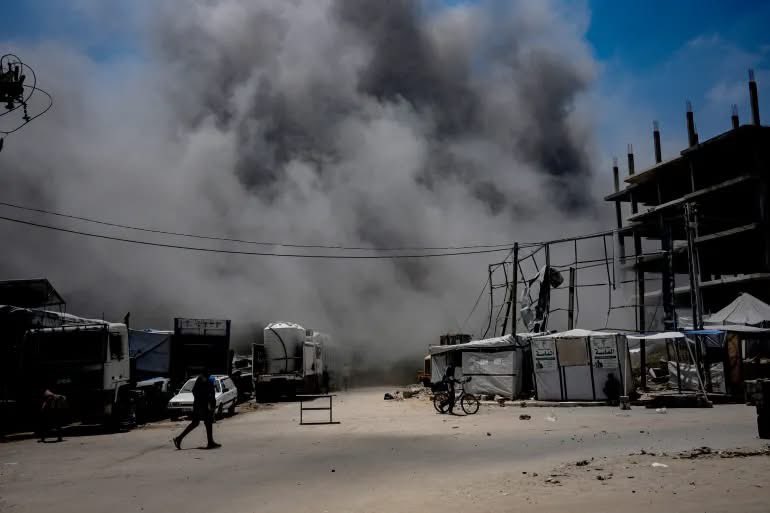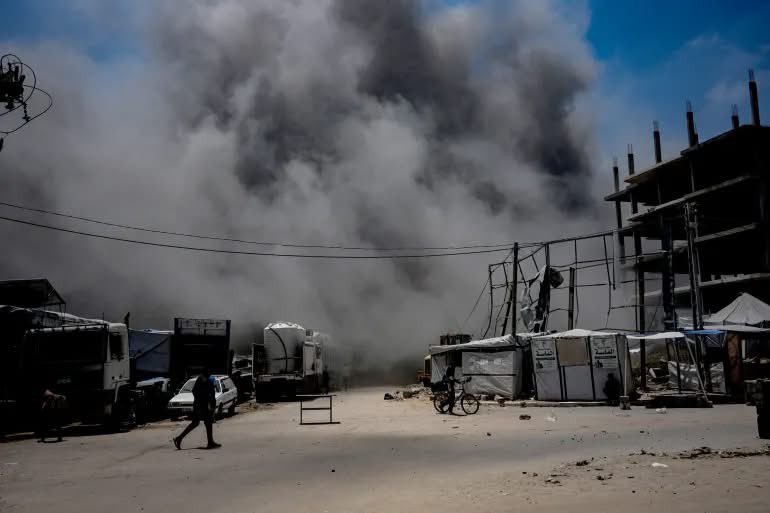Breaking: 70+ Palestinians Dead as Gaza Conflict Hits Cruel Peak
Summary of Recent Israeli Attacks in Gaza
In a devastating turn of events, Israeli strikes across Gaza have resulted in the deaths of over 70 Palestinians since early Friday. This escalation of violence has drawn significant international attention, with United Nations Secretary-General Antonio Guterres describing the situation as entering the “cruellest phase of this cruel conflict.” The ongoing violence highlights the dire humanitarian crisis unfolding in the region and raises urgent calls for peace and resolution.
Understanding the Context of the Conflict
The Israeli-Palestinian conflict has a long and complex history, characterized by deep-rooted tensions and intermittent violence. The recent escalation in Gaza is part of a broader pattern of conflict that has seen repeated confrontations between Israeli forces and Palestinian militants. The latest attacks have intensified fears of a humanitarian crisis, as the civilian population in Gaza grapples with the consequences of armed conflict.
The Humanitarian Impact of the Attacks
The recent Israeli airstrikes have devastated communities, resulting in significant loss of life and widespread destruction of infrastructure. The United Nations and various humanitarian organizations have raised concerns about the safety and well-being of civilians in Gaza, many of whom are already suffering from shortages of food, water, and medical supplies. The death toll, which has now surpassed 70, underscores the urgent need for humanitarian assistance and protection for vulnerable populations.
Guterres’ Statement on the Conflict
In his recent remarks, UN Secretary-General Antonio Guterres emphasized the severity of the situation, labeling it as the “cruellest phase” of the ongoing conflict. His statement reflects a growing concern among international leaders regarding the escalating violence and the urgent need for diplomatic efforts to cease hostilities. Guterres called for an immediate cessation of attacks and urged both parties to engage in dialogue to address the underlying issues fueling the conflict.
- YOU MAY ALSO LIKE TO WATCH THIS TRENDING STORY ON YOUTUBE. Waverly Hills Hospital's Horror Story: The Most Haunted Room 502
International Reactions and Calls for Peace
The international community has responded to the recent violence with widespread condemnation and calls for peace. Multiple nations and organizations are urging both Israel and Palestine to exercise restraint and prioritize the safety of civilians. Diplomatic efforts are underway to facilitate discussions aimed at achieving a ceasefire and addressing the humanitarian needs of those affected by the conflict.
The Broader Implications of the Conflict
The continuation of violence in Gaza has far-reaching implications not only for the region but also for international peace and security. The conflict poses challenges to regional stability, as tensions can escalate and affect neighboring countries. Additionally, the humanitarian crisis in Gaza raises questions about the responsibility of the international community to intervene and provide support to those in need.
The Role of Media in Reporting the Conflict
Accurate and responsible media reporting is critical in shaping public understanding of the conflict. The portrayal of events in Gaza can influence public opinion and affect policy decisions by governments around the world. It is essential for media outlets to provide balanced coverage that highlights the humanitarian impact of the violence while also addressing the complex political dynamics at play.
Moving Forward: The Need for Sustainable Solutions
As the situation in Gaza continues to evolve, the need for sustainable solutions becomes increasingly urgent. Long-term peace requires addressing the root causes of the conflict, including issues related to territorial disputes, security, and the rights of Palestinians. Engaging in constructive dialogue and fostering mutual understanding are essential steps toward building a foundation for lasting peace.
Conclusion
The recent Israeli attacks in Gaza have resulted in a tragic loss of life and highlight the urgent need for intervention and support for affected civilians. UN Secretary-General Antonio Guterres’ remarks serve as a reminder of the critical humanitarian crisis unfolding in the region. As the international community grapples with the implications of the conflict, the focus must remain on finding a path toward peace and stability for both Israelis and Palestinians.

Just in !
Israeli attacks across Gaza have killed over 70 Palestinians since early Friday, as UN chief Antonio Guterres says the war on Gaza has reached the “cruellest phase of this cruel conflict”. https://t.co/WZFirVUE8h
Just in !
Israeli attacks across Gaza have killed over 70 Palestinians since early Friday, creating a devastating situation that has drawn global attention. The conflict, which has escalated in recent days, has seen significant loss of life and widespread destruction. This new wave of violence comes as the United Nations chief, Antonio Guterres, states that the war on Gaza has reached the “cruellest phase of this cruel conflict.” The ongoing strife has left many wondering about the implications and the human cost of this protracted conflict.
Israeli Attacks Across Gaza
The latest reports indicate that Israeli strikes have intensified, with over 70 Palestinian casualties reported as of early Friday. The situation is dire, with many families mourning the loss of loved ones and grappling with the harsh realities of living in a conflict zone. The violence has raised serious concerns about human rights violations and the need for urgent humanitarian aid. As the attacks continue, the international community is calling for a ceasefire and a renewed focus on peace talks.
UN Chief Antonio Guterres Speaks Out
Antonio Guterres, the Secretary-General of the United Nations, has been vocal about the need for an immediate resolution to the conflict. He emphasizes that the current phase represents the “cruellest” part of an already brutal situation. His statements highlight the urgent need for humanitarian assistance and protection for civilians caught in the crossfire. Guterres has made it clear that the international community must act swiftly to address the escalating violence and provide support to those affected by the ongoing conflict.
The Human Cost of Conflict
The loss of over 70 Palestinian lives is not just a number; it represents families shattered and communities devastated. Each casualty has a story, a background, and loved ones who are mourning. This conflict has a profound human cost, affecting not just those who are killed or injured, but also those who are left behind. The psychological impact of living in a war zone can be immense, with many suffering from trauma, anxiety, and grief.
International Response and Calls for Action
The international response to the ongoing violence has been mixed, with some nations calling for immediate ceasefire while others remain silent. There is a growing chorus of voices urging world leaders to intervene and facilitate peace talks. NGOs and humanitarian organizations are also stepping up efforts to provide aid and support to those affected by the violence. The urgency of the situation cannot be overstated; as the death toll rises, so does the need for action from the global community.
Understanding the Roots of the Conflict
To grasp the current situation, it’s essential to understand the historical context of the Israeli-Palestinian conflict. This long-standing dispute is rooted in territorial, political, and cultural complexities. Both sides have deep-seated grievances, and any resolution will require addressing these fundamental issues. The cycle of violence has persisted for decades, and despite numerous attempts at peace, a lasting solution remains elusive.
The Role of Media in Conflict Reporting
Media coverage plays a crucial role in shaping public perception of the conflict. Reports from the ground can influence how individuals and nations respond to the situation. It’s vital for media outlets to provide accurate, balanced reporting that highlights the human stories behind the statistics. In times of conflict, sensationalism can often overshadow the reality faced by civilians, leading to misunderstandings and misrepresentations.
Humanitarian Needs in Gaza
With the escalation of violence, the humanitarian needs in Gaza have reached critical levels. Access to basic necessities like food, clean water, and medical care is severely compromised. Organizations on the ground are working tirelessly to deliver aid, but their efforts are often hindered by ongoing hostilities. The need for a safe and secure environment for humanitarian operations is paramount to alleviate the suffering of those affected.
Prospects for Peace
While the current situation appears bleak, there is still hope for a peaceful resolution. Many organizations and individuals continue to advocate for dialogue and negotiation. Building trust between the conflicting parties is essential for any sustainable peace process. Grassroots movements focused on reconciliation and understanding can play a critical role in bridging divides and fostering a culture of peace.
Global Solidarity and Awareness
Global solidarity with the Palestinian people has been evident in protests and demonstrations around the world. Many individuals and organizations are raising awareness about the plight of those affected by the conflict. Social media platforms have become a powerful tool for sharing information and mobilizing support. As more people become aware of the situation, the pressure on governments to take action increases.
The Importance of Advocacy
Advocacy is essential in pushing for change and holding those in power accountable. Individuals can play a role by supporting organizations that work towards peace and humanitarian aid. Writing to representatives, participating in peaceful protests, and spreading awareness through social media are all ways to contribute to the cause. Every action counts, and collective efforts can create a significant impact.
Conclusion: A Call for Compassion
As we reflect on the tragic events unfolding in Gaza, it is crucial to approach the situation with compassion and empathy. Behind every statistic is a human life, a family, and a community enduring unimaginable hardships. The path to peace may be long and fraught with challenges, but it is a journey worth undertaking. Together, through understanding and collective action, we can work towards a future where peace prevails and the rights of all individuals are respected and upheld.

